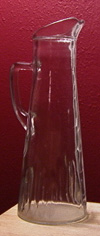English 5599 - Creative Writing For Teachers
Final Portfolio
Contents:
1. Description of an Object
2. My Civilization (Poem)
3. White Smoke (Poem)
4. Spiral (Poem)
5. Coffee Craze
6. Glaukos Lost
7. Munday Times (Chapter One)
8. Justification for Creative Writing
"I listen to the voices." ~ William Faulkner
Descriptive Piece:
1. Description of An Object

I hold in my hand a narrow glass pitcher. (13 diverse descriptions)
1. There are deep vertical grooves cut into the glass pitcher on two sides near the base. If I were to turn it on its side, I could rest a cigarette in one of the grooves. If I smoked.
2. FEDERAL LAW FORBIDS SALE OR RE-USE OF THIS BOTTLE. L9517 D-126 58.61
3. This object serves a dual purpose. Holding it just so allows it to be brass knuckles and a Billy club at the same time. Too bad it is made of glass.
4. I hold in my hand room-temperature ice. To my knowledge it has never been inside of a freezer.
5. Turned upside-down, this pitcher resembles a sugar cone from the ice cream parlor.
6. This pitcher must have previously been home to a marine mollusk. When I put it to my ear, I hear the ocean.
7. This is a bowling pin in a glass house.
8. This is an overgrown paperweight.
9. This is a hard-to-clean ashtray.
10. This is a monochrome kaleidoscope.
11. This is an antique thermos.
12. This is a low volume trashcan.
13. This is nothing but an old shelf ornament.
Poetic Pieces:
2. My Civilization
America-my civilization,
my neck of the woods.
The cowboys, the Indians, the Mets.
Rivers, lakes, the Hudson.
California girl,
West Texas sunset,
Florida coast.
New York.
Liberty. The Towers.
The Towers.
Storm befalls the calm.
Downpour.
Fire, metal, ash.
I gasp.
America.
My civilization.
3. White Smoke
He brandishes white,
no other color.
The small of his back
hides polished nickel.
His eyes narrow,
his mind narrow
like a one-way street-
A hot sword
upon the Muslim,
a fuming manifesto
against the Party,
a burning cross
against that other race,
a god to himself.
His pale head shaved,
his shirt parading Dixie.
O, strip off that procession of hate,
put down that gun.
Disarm, defuse.
His dog uneasy
when he approaches.
The fear he summons
flows from fear inside.
Yet it persists,
like noxious gas,
whirling.
The white odor
lingers in his wake,
present like burning sulfur.
I choke.
The only color he knows is
white.
4. Spiral
Endless spiral,
whorl and twirl,
unbroken turning,
churning, spinning.
I am Spiral, endless spiral.
Faster, stronger, brilliant blur.
Cannot anchor, curving faster.
Whirling whirlwind,
twisting twister,
mammoth helix,
coiling,
spin.
Rising? Falling?
Hard to tell.
Where's my center,
up or down?
Escalate?
Degenerate?
Rocket, plummet,
I will spin.
Cannot stop,
Will not stop,
Dare not stop and cease to be.
For this spiral is my life,
And life is nothing more than me.
Pondering Pieces:
5. Coffee Craze
You stand there waiting and think, What will it be today? Dark? Medium? Light?
It really doesn't matter so long as the barista keeps it pure. None of that sissy stuff.
Give me anything high tested, you say to yourself. Make me jitter until I can't concentrate on anything.
You fancy the bitter white alkaloid shooting through your central nervous system. It's for mental alertness, you say. For stamina. Good for the digestion. You hear it also decreases the risk of gallstones. Who likes gallstones?
You stand there waiting and think, Give it to me strong. A Ristretto. No, make it a Doppio. After all, a Lungo is a good waste of a bowl. The stronger it is the more anti-oxidants. Lowers the risk of bowel cancer, they say. Boosts stamina, brain function. Heightens pain relief. Imagine that. You can take it with Advil. Take two with Joe and call me in the morning.
Speaking of doctors.
Funny the faces people make as they doctor theirs. Contaminate theirs. A little sugar, a sip, then a grimace. A little more sugar. Or cream. Another funny face.
Why pollute it?
Even the guy behind the counter offers to mess it up. Steamed milk. Froth. Chocolate. I'll be damned if some places don't even offer it with whiskey.
Why mess with perfection?
You stand there and it's your turn. You're pissed. All these Dandesoycino drinkers and other vegan hounds have impaired your disposition.
"What will it be today," she says.
"Coffee. Black."
6. Glaukos Lost
They regurgitate what they've been taught. The writers of history, I mean. And if they're not sure about something, they make it up.
We have to fill in the gaps, they say. It's what we do. Nice, neat package.
The real reason they do this is so our kids grow up confident that they know something. Feed them this sh*t and they feel good about themselves.
Memorize the nine planets in the solar system.
Easy enough.
Learn your multiplication tables.
Piece of cake.
Learn the philosophers from Thales to Foucault.
Okay.
They don't ask questions. It's locked in. They feel warm and fuzzy. They are the gods of academia, the little bastards.
It's about self-esteem. It's about teaching the children that they are great. That they can move mountains. That they can f**king fly. They get this for twelve years, and the kids who swallow it graduate to prison.
So Thales is the first Western philosopher. Scholars throughout antiquity agree. It's a fact. Write it down and sign in blood if you want.
But what if I told you that some other guy predicted that solar eclipse? What if I said Thales was a wag?
Thales had a neighbor named Glaukos. Glaukos was a genius. You don't know this because scholars don't know this. See, most of the facts were long gone by the time Aristotle came on the scene. What did Aristotle know? Misinformation. Add that to speculation and you get a twisted history.
Where is that blasted papyrus about Thales' prediction? he asked.
Disintegrated, they said. Got old.
You'd fall apart too if you were a smashed and dried water plant.
Here's what happened. The account of Glaukos, a pensive hermit, and Thales, a dull-witted rogue, was inscribed on papyrus in 584 B.C. (This is the year after the eclipse.) Thales was steeped into the tradition of his ancestors. Greek mythology to him was factual, like his accomplishments are to you. Glaukos, god rest his soul, was interested in knowledge. He scribbled little notes about everything.
Everything is water, he said.
Through his work, reductionism was born. He wrote a book. We lost the book.
They were neighbors. That's the only connection.
So through the years, scribes would copy this account by hand to fresh papyrus. Scribes get sleepy and sloppy and slappy. They make mistakes.
In time, these erroneous copies became fragmentary. Key passages wore out. Glaukos' name disappeared. Oral tradition further clouded the fruit juice.
What we have now is a history fraught with error. It's not funny.
Radical revision of a journal entry on "fulfillment":
7. Chapter One of my novel, Munday Times
My novel excerpt is not reproduced here. I hope to find a publisher once it is completed. Until then, it will not be produced publically.
Justification For Utilizing Creative Writing In the Classroom:
Creative Writing and the Classroom
Happy is the man or woman who grows through the act of written exploration. Writing as a means of exploring and discovering seems an invaluable tool for anyone who desires to grow in the knowledge of himself and his world. Besides, it's really a lot of fun. Through the course of the semester, I have found this to be true for me. This semester has given me the opportunity to use the act of writing as a vehicle by which ideas are forged and philosophies are altered. During the class, I have experienced occasions of sheer elation by some epiphany that has struck me in the most unassuming moment. These occasions have been profound revelations in my life, like deep wells of pure water. Sometimes, the knowledge I have acquired is inscrutable and borders on the sublime.
My desire as an educator is to give my students the opportunities I have been given, so that they might experience the rich and dynamic world of creative writing. When a student writes creatively, she proceeds into an unruly environment (the mind) and begins to draw from it ideas and opinions that make sense. This act can be labeled as "cultivating chaos." The principles I have learned as a means of cultivating chaos is sufficient justification for the implementation of creative writing in any classroom. In fact, I mean to argue that every teacher should use creative writing in the classroom for three primary reasons. These reasons reflect my understanding of the principles of cultivating chaos.
First, creative writing is a powerful tool for the acquisition of knowledge. Any act of exploration leads to knowledge. What better way to allow students to explore the diverse ideas in their field of study than in the act of creative writing? When we use creative writing as a means of investigation and study of the things already known to some degree, new knowledge inevitably develops.
Second, the nature of creative writing reflects the nature of knowledge, i.e., that it is mysterious and vigorous. Just as the world of the mind is flexible and elusive, the act of exploring the things of the mind on paper is equally so. But why should it be any other way? Doesn't knowledge share the very same consistency? We can never hold firmly to any piece of knowledge as if it were a block of wood. Rather, we wrestle with it, "play" with it, and use it for our benefit.
Third, creative writing is conducive in any field of study. You don't have to be an English major to benefit from exploratory writing-which is what creative writing essentially is. The scientist must learn, just as he has through the study of empirical data, to explore the subtleties of life through exercises in free writing. In like manner, the accountant should escape from numbers and explore words, ideas.
Creative writing is a process. It is also quite personal. The writer must leave inhibitions at the door if he is to succeed in discovering something hidden. The willingness to do so is damaged if one is not allowed to shut the door of the world in order to be alone with her mind.
Regardless of the field, regardless of the person, creative writing is a pathway of little resistance. The best way to pave this road for students is to allow them to keep a journal for their own eyes. That way, they are able to be liberal and relaxed with their thoughts.
